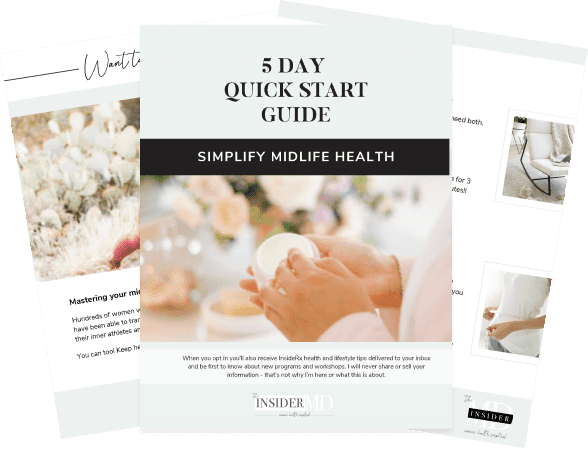
Sugar, Salt and Your Blood Pressure
For many years, too much salt has been blamed as the main culprit when it comes to high blood pressure. But it turns out, sugar may be an ever bigger enemy. Don’t worry, natural sugars in fruits and vegetables are fine. It’s the excess added sugars, especially high fructose corn syrup that we need to watch out for.
In this blog post, we’ll take a closer look at the relationship between salt and sugar intake and your cardiovascular health. We’ll also discuss the easiest and most impactful ways to cut added sugar and salt from your diet.
Let’s get started!
How Your Body Monitors Blood Pressure
Keeping your blood pressure in a good range is critical. Blood pressure that’s too low can deprive your brain and heart of enough oxygen to carry out its functions, leading to damage. Chronically high blood pressure cause hardening of the artery walls (atherosclerosis), heart attack, stroke and aneurysms.
There are specialized baroreceptors throughout the body to monitor blood pressure changes. When blood pressure is too low, the body has no way to automatically increase blood volume, so it compensates by activating catecholamine, or adrenalin, hormones which constrict blood vessels, making it harder for the heart to pump blood through the arteries, which raises blood pressure. These are the same hormones that get activated when blood glucose is low.
When blood pressure is too high, the body releases nitric oxide to relax (dilate) the blood vessels, making it easier to pump blood through the arteries. When blood vessels in the kidney expand, it causes them to release more water into the urine. This effect is known as diuresis, or the removal of fluid which lowers blood volume.x
These are just a few of the ways the body has to control blood pressure, and they are the most common.
How Do Sugar and Salt Affect Your Blood Pressure?
Many studies have shown that, while salt is essential for keeping your body fluids properly balanced, too much salt pulls water into your blood vessels, increasing the total amount (volume) of blood inside them. With more blood flowing through your blood vessels, blood pressure increases. Chronically elevated blood pressure can lead to heart disease and stroke.
More recent studies have shown that excess sugar consumption can also increase your risk of dying from heart disease, even if you’re not overweight. That’s because, over time, excess sugar in your bloodstream causes inflammation and hardening of the arterial walls which raises blood pressure and can lead to heart disease and stroke.
How Much Sugar and Salt is Too Much?
The American Heart Association guidelines suggest that women should consume no more than 100 calories or about 6 teaspoons of added sugar per day.
No more than one teaspoon (6 g) of salt per day is recommended for the average adult and no more than about two-thirds of a teaspoon (1500 mg) for those with high blood pressure.
Easy Ways to Start Reducing Your Sugar and Salt Intake
- Read labels. Choose products with the lowest amount of sodium and added sugars on the ingredient list. The lower down the ingredient list, the better.
- Be careful with condiments. Sodium is found in many condiments— including soy sauce, Worcestershire sauce, salad dressings, ketchup, seasoned salts, pickles, and olives.
- Speak up. When dining out, ask to have your food prepared with less salt.
- Cut back. Try cutting the usual amount of sugar and salt you add in recipes by half and wean down from there. Most times, you won’t notice the difference.
- Eliminate soda. Stop drinking soda which can contain 8 -13 teaspoons of sugar per serving and lots of sodium too! Water is the best, but if you want something sweet, diet drinks can be a better choice, while you wean. Fruit juice and coffee drinks are also packed with sugar.
- Add fresh fruit. Add fruit instead of syrup or sugar to oatmeal or cereal. Swap mashed berries for jelly or jam on peanut butter sandwiches.
- Substitute. Switch out sugar with unsweetened applesauce in recipes (use equal amounts).
- Buy fresh. Processed foods tend to have a much higher salt and added sugar content.
- Avoid effervescent tablets. Dissolvable effervescent painkillers and vitamin supplements can contain as much as 1g of salt per tablet. Where possible, choose capsule alternatives instead.
Sugar, Salt and Your Blood Pressure: Final Thoughts
We’ve all been told that too much salt and sugar in our diets is bad for our health. Understanding how what you eat affects your body is the best way to take charge and start optimizing your midlife health.
If you want to dive deeper, check out the Mastering Menopause program where you’ll find everything you need to manage and thrive though midlife, all in one place!

MEET DR. ELLEN
My mission is to bring you the most up-to-date, proven medical information, simplified, so you can make confident, educated decisions about your health.
I'M LOOKING FOR...
grab your 5 day
quick start guide



